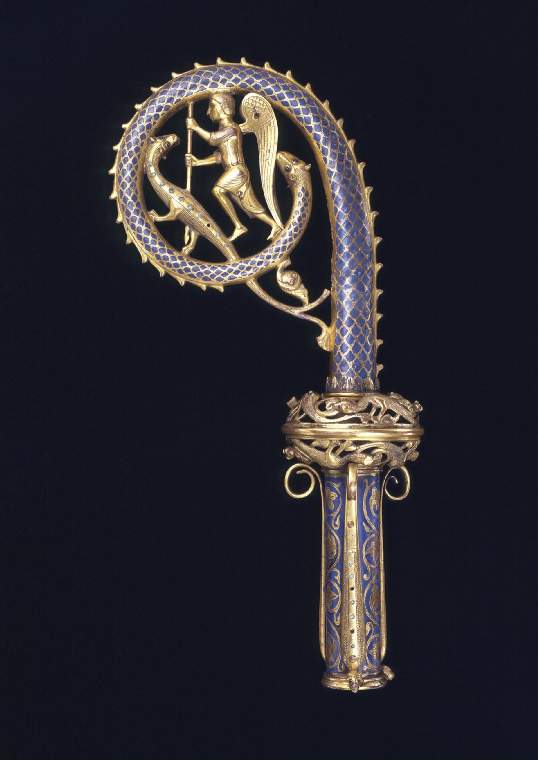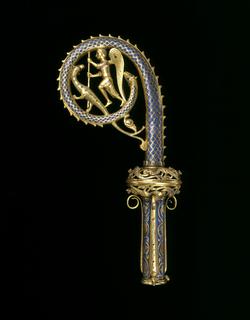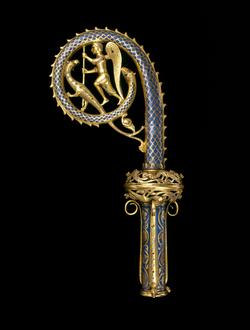Current Location: In storage
Titles
St Michael and the Dragon
Maker(s)
Workshop:
Unknown
Entities
Categories
Description
Copper, champlevé, engraved, chased, enamelled and gilt, the volute terminating in a serpent's head, and having a two-legged dragon inside it being attacked with a staff by St Michael
Copper, champlevé, engraved, chased, enamelled, and gilded. The shaft is in two sections divided by a knop of flattened sherical form with a central ridge. The knop is of an openwork design of eight biting beasts, their tails ending in foliated scrolls. They are engraved with a scale pattern, except for a plain band on their back which is studded with three small turquoise pastes. The lower or socket part of the shaft is decorated with blue enamel with a foliated scroll pattern reserved in the metal. To it are attached three beasts (one missing) with their heads downwards and their tails curled above touching the lower part of the knop; the back of each is set with turquoise pastes. The crook which springs from a collar of leaves, has a serrated outer edge, and is decorated with a scale pattern in blue enamel; it terminates in a serpent's head. The volute contains the winged figure of St Michael plunging a spear vertically through the back of the dragon. Its body is marked with scales except for a plain band running down either side which is studded with turquoise pastes, and its tail passes through the curl of the volute terminating in a spray of foliage fixed to the stem of the crosier.
Notes
History note: Countess Chandon de Briailles; purchased from Félix Joubert (1872–1953), Chelsea
Legal notes
Given by the Rt. Hon. F. Leverton-Harris
Acquisition and important dates
Method of acquisition: Given
(1924-06-20)
by
Harris, Frederick Leverton
Dating
13th Century, first half
Medieval
Circa
1220
CE
-
1240
CE
Note
The Book of Revelation 12:7-9 (the final Book in the Christian Bible) tells how the archangel Michael and his angels defeated the dragon, alias Satan, in battle. Satan and his angels were then cast out of heaven. During the Middle Ages, this was one of the most popular themes for the decoration of the volutes on croziers (from the Latin crocia, a crook), because it symbolised the bishop’s duty to eradicate sin from his diocese, and to protect his flock from evil. Some fifty-eight croziers ornamented with this subject have been recorded, out of which about thirty are of this type, with a volute terminating in a serpent’s head, and inside the volute, a two-legged dragon being attacked with a staff by St Michael. The croziers were made over a long period. One was found in the tomb of Pelahyo de Cebeyra, Bishop of Mondoñedo (d. 1217), now in the the Museo Nacional d'Art de Catalunya, Barcelona, and another in the tomb of Bishop Jean II de la Cour d’Aubergenville (d. 1256) in Évreux Cathedral. They appear to have been passed down with other ecclesiastical objects, and some were buried in the tombs of clerics buried long after their presumed date of manufacture. An example was found in a mid-fifteenth century Bishop’s tomb in Notre Dame in Paris.
People, subjects and objects depicted
Components of the work
Decoration
composed of
paste (glass)
( turquoise)
enamel
gold
Whole On Stand
Height 35.8 cm
Materials used in production
Copper
References and bibliographic entries
Identification numbers
Accession number: M.2-1924
Primary reference Number: 139831
Stable URI
Audit data
Created: Saturday 6 August 2011
Updated: Thursday 6 February 2025
Last processed: Thursday 14 August 2025
Associated departments & institutions
Owner or interested party:
The Fitzwilliam Museum
Associated department:
Applied Arts

 IIIF Manifest
IIIF Manifest





